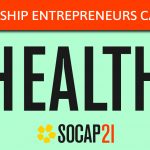Launching with this issue of the Good Capitalist are two of what will be our continuing focus areas in the run up to the forthcoming SOCAP conference in September of next year.
The first: we will be writing about (while taking part in) a study project meets learning and IP sharing network that’s looking at what’s working for the pioneers in place-based innovation organizations; from incubators like GoodCompany in Philadelphia, to Bull City Forward in Durham, to what we do in the networks of HUBs in the United States from Seattle to Los Angeles to San Francisco and Berkeley, to cooperative communities like Vuollerim in Swedish Lapland.
Christopher Gergen, who has written an article in this newsletter, is going to be leading the learning group, and I will be part of it and also write about it for the Good Capitalist, as I expect will Christopher from time to time. It’s our hope that members of the learning group will be creating content to appear at SOCAP that will highlight what’s working around the country and around the globe in the sphere of place-based innovation. Christopher will be leading that theme, and I’m just along for the ride.
The second focus area launching with this Good Capitalist issue is on health, or maybe Health; imagining healthy families, healthy communities, and a healthy planet as one way to conceive of the goal toward which market-based, non-profit, and publically-funded poverty alleviation efforts are aiming. Using health as a frame changes the aim from stopping something to creating what we want to create. The game changes from reactive to proactive.
This shift is very appealing, and it’s consistent with what we intend to generate in the spaces we create. So, we’ve had some internal dialogue among the HUB and SOCAP team about adopting Health as the core theme for SOCAP13. We decided that putting the entire next SOCAP conference under the banner of health would make some people think the conference was too narrow and not for them. So instead we are going to make health an uber track, or even potentially a mini conference inside SOCAP13.
The health track will be the story of one person. We are looking at the frame of designing the United States healthcare economy for the benefit of an urban woman with chronic type 1 diabetes who is also keeping grandchildren. There is a confluence of technology and policy that could make this hypothetical patient an extremely powerful pivot point healthcare customer. This confluence would justify designing the economy around her from the standpoint of financial return for investors, lowered cost of delivery, higher degrees of self-managed health, and positive social change.
Her position in our societal balancing act makes her an obvious candidate of much attention when we use the lens of the permaculture principle that states, “make the least change for the greatest effect”. The urban grandmother would be the focus of a truly blended value economy, one where valuable things have respect and social worth, and things that cause damage pay the price.
With Obamacare, the urban grandmother is going to have a lot of powerful insurance forces that want her to live a healthy life, a life that lowers the long-term cost of health care provision to her. And there are amazing, low-cost mobile apps that can help her keep up with her blood sugar, her serotonin and depression levels, her activity levels and more, so she knows when to eat a snickers or when to take a walk to feel better.
Diabetes is a disease that can be managed by an informed person willing to do what it takes to get healthy. A health care economy designed to help the urban grandmother change her behavior – empowered by information and a community helping her take advantage of that information (maybe her teenage grandchild who checks her smart phone apps for her) – is a powerful one.
This is an economic design that would reduce the cost but bring higher quality health care. It’s an economic design that is already creating a flood of innovative digital health and mHealth startups that are getting real venture investment. (mHealth, or mobile health, is a term that refers to the use of mobile devices in support of public health, such as text message reminders to take medications.) It’s a space where mission creep is not a risk for an impact investor; if you are serving chronic type 1 diabetes “customers” you will be serving and empowering the poor and helping them become more able to better manage their lives through a combination of tools and behavior change.
For startups targeting that valuable urban grandmother client as their focus, it all boils down to: step 1, integration of the plethora of mobile apps into something it’s easy to manage and not confusing to someone trying to put together a diabetes management plan; and step 2, adoption.
Putting the power of health decisions and data gathering into the hands of the urban grandmother is a great idea, lowering costs while increasing quality. But, take note, it’s a market where new entrants need to be sure they enter in a culturally sensitive way. In this new arena of prescribing jointly managed behavior change as the path to health, there are a lot of power relationships that have to be tended to with high awareness of the difference between a well-meaning intent and the potential impact on the recipient.
All of those cultural complexities – the clear social good of bringing powerful technology tools to poor people that can increase both health and agency – make this a really interesting story that I think can point to how we could Accelerate the Good Economy, which is the theme of the next SOCAP.
Where this story will go, I don’t know. This is the kind of project that lends itself to creating a documentary and maybe attempting to make it a transmedia story (using web, mobile, real world, poster contests, and other means to influence social action and carry an activist’s goal forward).
The transmedia approach may be a potent framework for actually redesigning the health care economy the way this story is exploring. It would mean bringing in lots of voices, including of course those of the people we are trying to help. Partners who could help put these pieces together and make it happen have emerged. It could be that the resources will arise to enable this story to reach that place of change-making potential. Either way it will be part of a major SOCAP13 focus that I and perhaps others will continue writing about in the Good Capitalist. Stay tuned.





